Introducing The Chosen, Season 1, Ep 1: “I Have Called You By Name”
Looking for a new TV show to binge (for free)? Interested in ancient Judeo-Christian history? Like to see old tales told in fresh, creative ways?
Then you have to watch the sleeper hit called: The Chosen — a retelling of the stories of Jesus and the disciples as you’ve never seen it before.
In the first episode, we meet a demon-possessed woman, two brothers getting to the end of their rope, a social outcast with a “unique” job and condition, and a religious leader whose entire worldview is about to get shaken to the core.
And in this article, I’ll be pulling apart this episode with background info and commentary on the craft/creativity side of this retelling.
About The Chosen
The Chosen is not only entertaining and thought-provoking, it’s also a multi-season “binge-able” TV series based on the life of Christ and his disciples. It’s the biggest crowdfunded project in the history of TV crowdfunding, not just for faith-based projects, but ever (raising millions of dollars from tens of thousands of donors).
What makes The Chosen unique is the show creators’ approach to the characters of Jesus and the disciples. In many gospel retellings, Jesus is portrayed as holier and more distant than “normal humans.”
But in The Chosen, both Jesus and his disciples are down-to-earth, relatable people: Jesus has a believable sense of humor and the disciples are seriously yet lovably flawed.
And because this is a multi-episode, multi-season show, the show is able to explore some of the most intriguing stories in the gospels with much more time and care and depth.
Granted, this is a retelling and many elements of the story are altered, as the show itself reminds viewers in the episode 1 disclaimer:
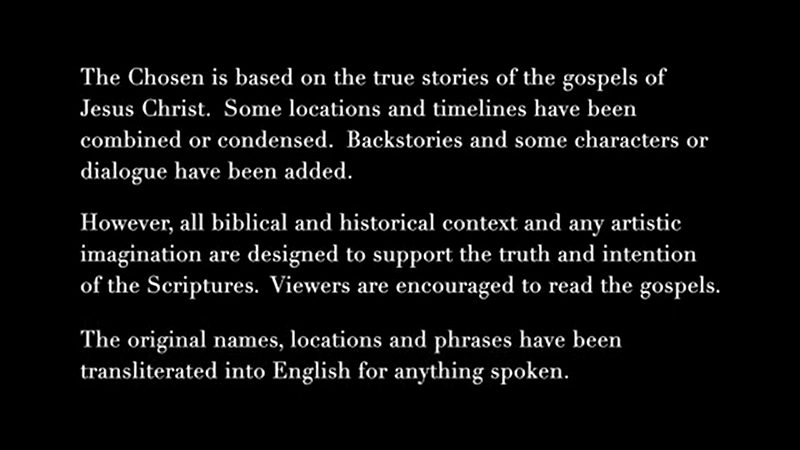
But what it has been able to do with the source material is nothing short of amazing.
In this review, I’ll be summarizing the episode (spoiler alert!) with some context and background information as needed. I’ll save the more lengthy background discussion for after the summary section.
Then, at the end, for writers: I’ll take a look at some elements within the writing and storytelling to examine what makes the entire piece work so well.
MAJOR SPOILER ALERT: Read this article AFTER you’ve seen the show, which you can watch for free at https://watch.angelstudios.com/thechosen
The show creators’ goal is to spread the word to a billion people around the world, so they decided to make the show free for anyone who would like to see it.
If you are able and would like to contribute financially so others who can’t afford to pay can still watch for free, you can pay it forward by buying clothes, books, and DVDs from their gift shop or via direct donation.
Summary
The story begins on a night in Magdala, in 2 B.C., when a little girl approaches her father, who is coughing outside the tent.
She tells him she can’t sleep because she is scared. The child’s father takes her on his knee and comforts her with the words of Isaiah:
But now, this is what the Lord says —
he who created you, Jacob,
he who formed you, Israel:
“Fear not, for I have redeemed you;
I have summoned you by name; you are mine.” [emphasis added] Isaiah 43:1
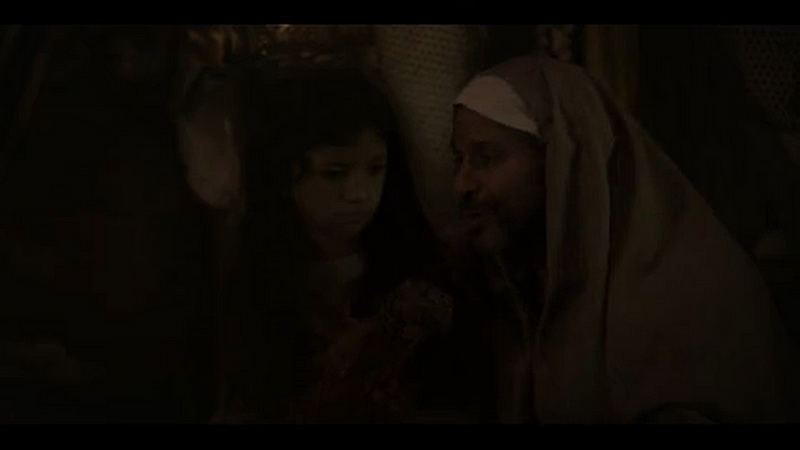
(Note: Pay attention to those last three words in the above Bible passage— they come back.)
The final shot of the scene ends on the little wooden doll that the child clutches in her hands as she sits in her father’s embrace.
Next, the camera shifts to a bedraggled-looking woman who wakes up with a start and discovers blood all over her hands.
Beside her on the wall is an older-looking wooden doll. The same doll that the child was holding in the earlier scene.
It’s the little girl from Scene 1, all grown up:
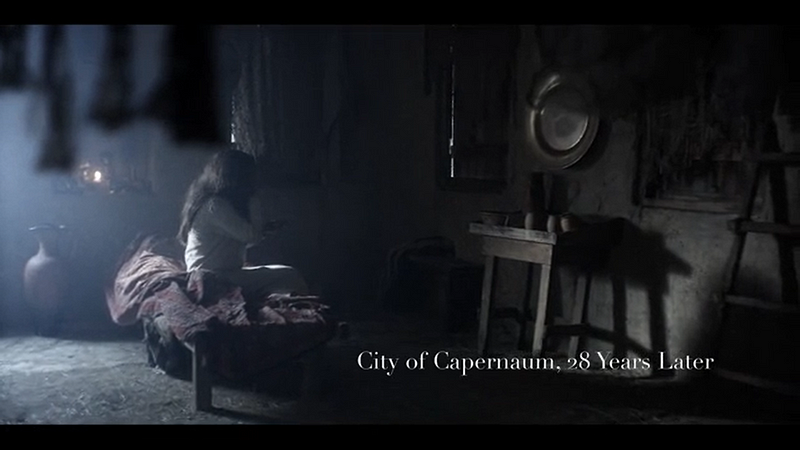
Outside, a man screams for help, blood dripping down his face. As he stumbles into startled pedestrians and a Roman soldier who calls him a “filthy dog,” he cries that a demon-possessed woman tried to kill him.

And at this dramatic moment, we cut to the opening credits:
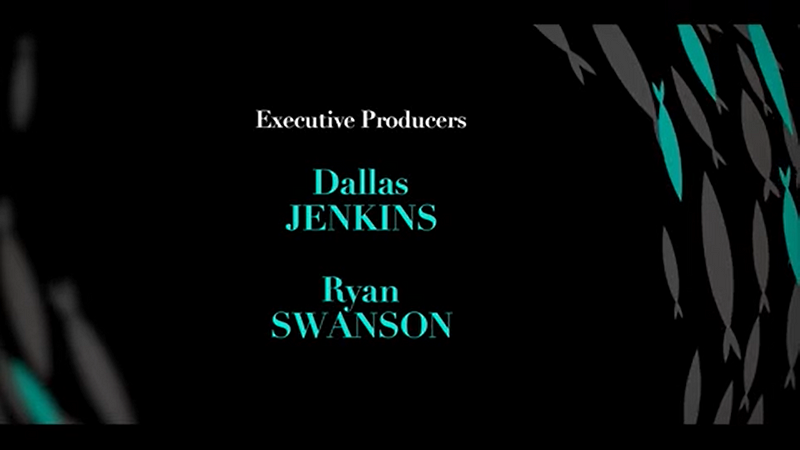
As the cast and crews’ names appear on the screen, a crowd of gray fish swims slowly counterclockwise.
But one by one, 13 fish turn blue and begin swimming against the current, as a gospel-style opening song plays in the background, accompanied by electric guitars, percussion, and traditional-middle-eastern-sounding string instruments.
The next scene opens with a well-dressed Pharisee (Nicodemus) and his wife, traveling in a horse-drawn carriage. They are interrupted by a Roman (Quintus) who goes up to the carriage and introduces himself as the Praetor of Capernaum.*
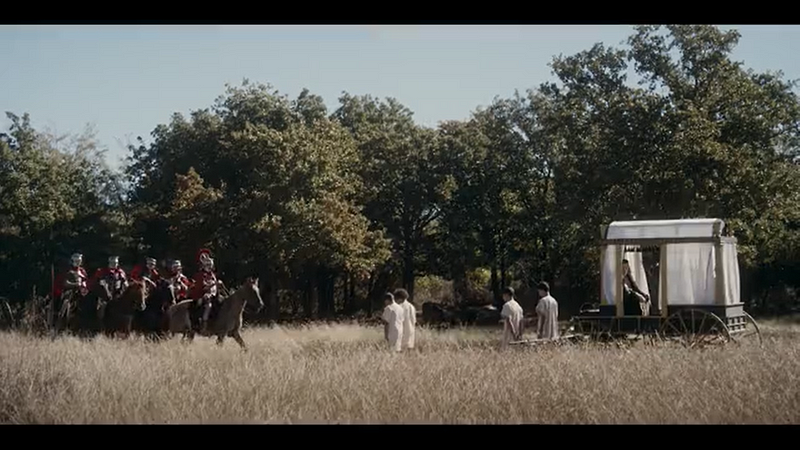
When Nicodemus talks about serving only God, Quintus confronts him with the other Jewish groups (Essenes, Sadduccees, Zealots, “rogue preachers raving about a coming Messiah”*) who all disagree with Pharisees.
He asks Nicodemus for his help with making the Jews pay taxes. In exchange, Quintus says, he will support the Pharisees against their competitors.
When Nicodemus points out that his people are already drowning in taxes, Quintus answers him with a riddle: “What can be under the water and yet never drown?”
“Fish?” says Nicodemus.
Next, we see a young man (Matthew) living in what is obviously a luxurious home for that time period, getting dressed and ready to start his day.
His movements are careful and deliberate and slightly odd, a hint that he is a bit different from the others (some may say “on the spectrum”).
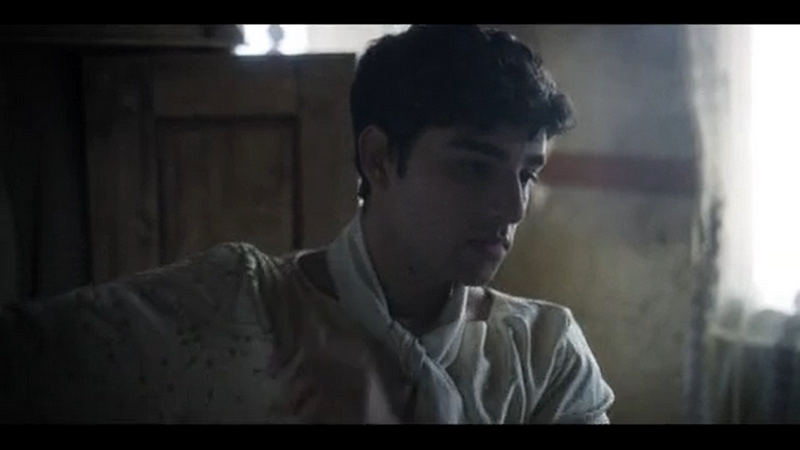
As he walks outside, Matthew dodges rats and accidentally steps in a pile of poop that makes him gag. Matthew throws away the pair of shoes polluted by the poop, to the consternation of the hostile cart driver he’s hired to carry him to his place of work.
Matthew hides under a tarp because the driver doesn’t want to be seen with him:
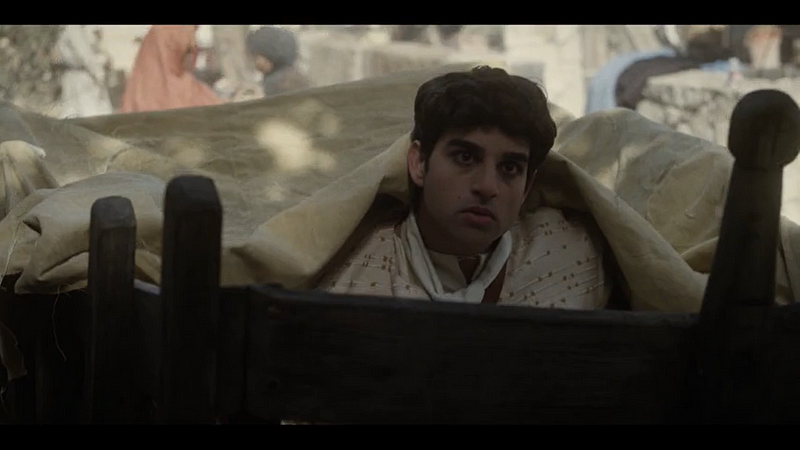
Meanwhile, Rabbi Nicodemus is giving a lecture to a crowd of attentive listeners.
He preaches against the sin of fishing on the Sabbath*, and condemns the fishermen’s tendency to gamble and do other unsavory things, telling the crowd that “The Messiah will not come until this wickedness is purged from our midst.”
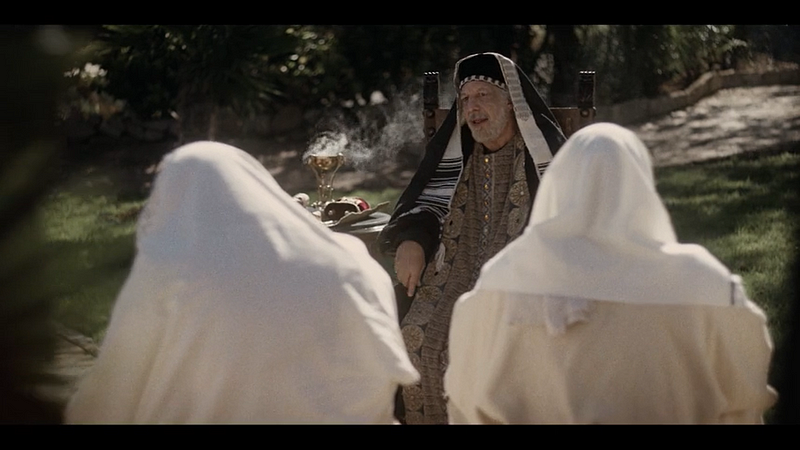
Next, Nicodemus enters the Torah Room in the local synagogue after greeting his student, Shmuel. He reiterates the importance of keeping fishermen from fishing on Shabbat (the Sabbath).
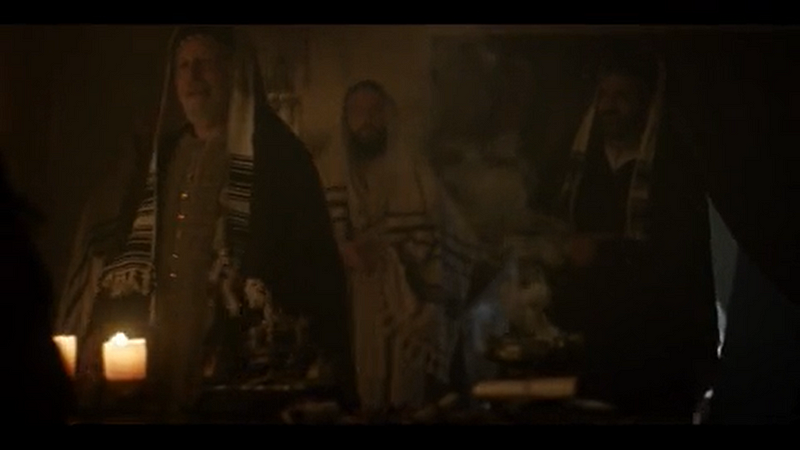
Shmuel tells Nicodemus that the Romans believe Jews don’t work on the Sabbath, and therefore the Romans don’t patrol on Friday night. Another rabbi cuts in, saying: “they are just trying to feed their families.”
They are interrupted by a Roman centurion who pushes his way into the room and says, upon looking around:
“Impressive, looks like we’re not the only ones taxing the people.”
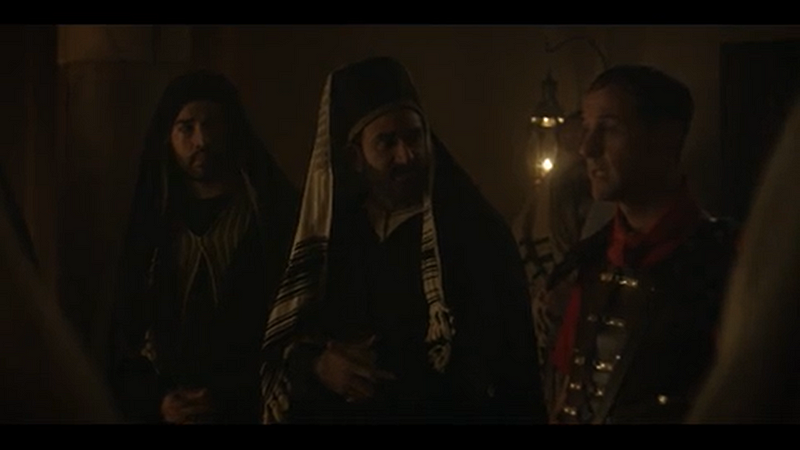
The centurion has come to ask (that is, command) Nicodemus to take care of a particular problem:
“I’m here about a Hebrew woman, in the Red Quarter. Let’s just say she’s been causing a disturbance.”
Back to Matthew, who is unceremoniously dumped a good distance away from the marketplace because the cart driver he hired is afraid of being seen transporting a tax collector, which is what Matthew is*.
Matthew picks his way through beggars who cry for money and ask if he is the Messiah. He finally makes his way to his tax booth, where he meets his Roman bodyguard, Gaius:

Gaius lets Matthew into his tax booth while elsewhere, a tentative Nicodemus follows the Roman centurion to the Red Quarters, where unsavory characters beckon.
To the side, a Roman soldier is scrubbing away a piece of graffiti*:
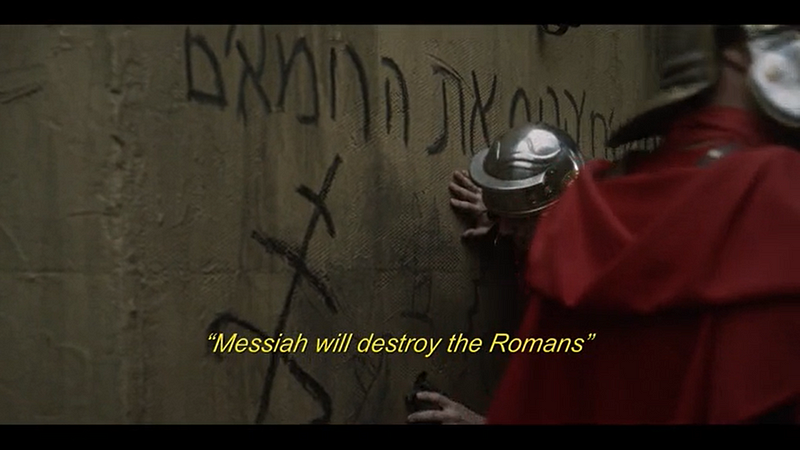
Then we cut away to a fistfight between a dark-haired man (Simon Peter) and two guys who turn out to be his brothers-in-law, Jehoshaphat and Abraham.
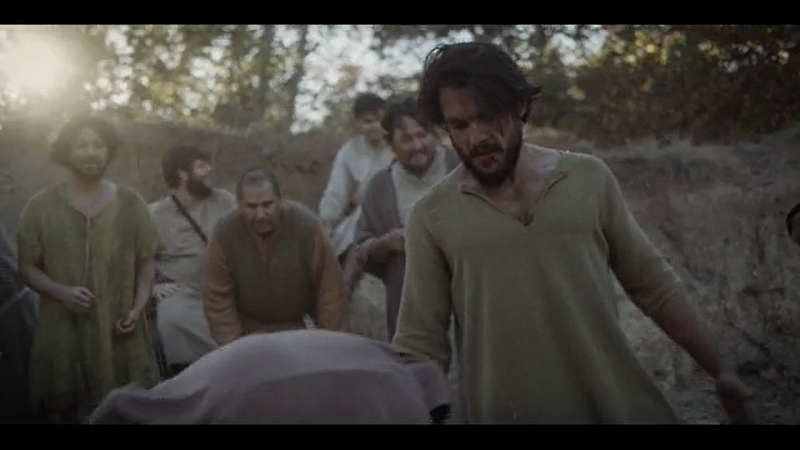
As he loses the fight, we see a curly-haired man (Andrew, Simon’s brother) shake his head in disappointment and hand over a bag of coins to a man beside him, obviously having just lost a bet.
Later, on the shore, Simon complains to Andrew about his brother-in-laws’ unfair fighting practices (two on one!)
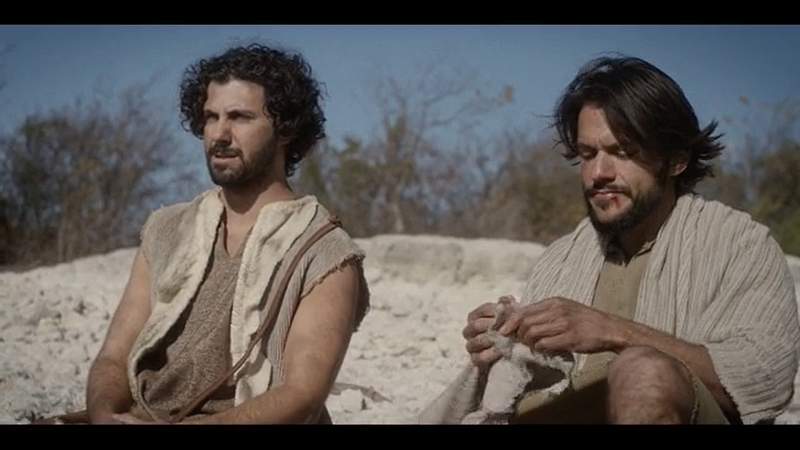
They talk about their financial troubles, and the upcoming Tax Day. They discuss the high probability that they will lose their boat. Then Peter says he’s off to go fishing. Andrew protests: “It’s Shabbat in an hour!”
Simon replies: “The Pharisees make allowances for that if lives are at stake.”
Andrew: “No one’s life is at stake!”
Peter: “No, no, not this moment, but it’s coming! What, you gonna tell your bug-eating friend about it?” (referring to John the Baptist, who has not yet appeared in this show…just wait ;D)
Meanwhile, Nicodemus attempts to cast out the demons from the woman in the first scene. He asks her friend how long she’s been like this. The friend, Rivka, refers to her as Lillith*:
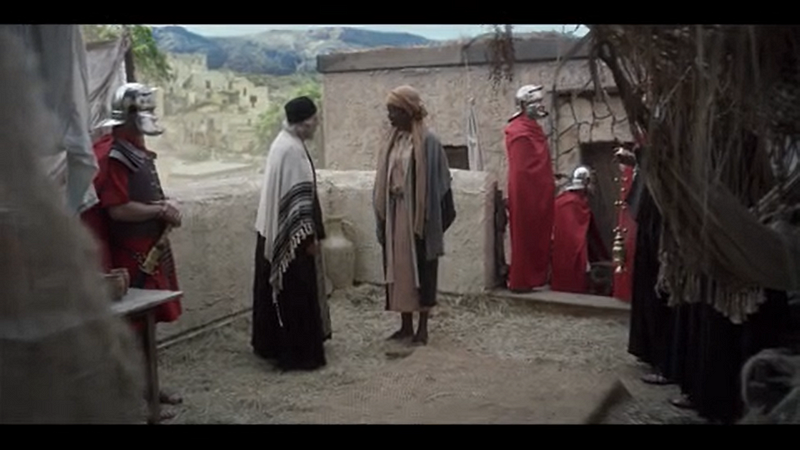
Nicodemus attempts an exorcism, but is driven away when Lillith turns to him and speaks in the voice of many demons:
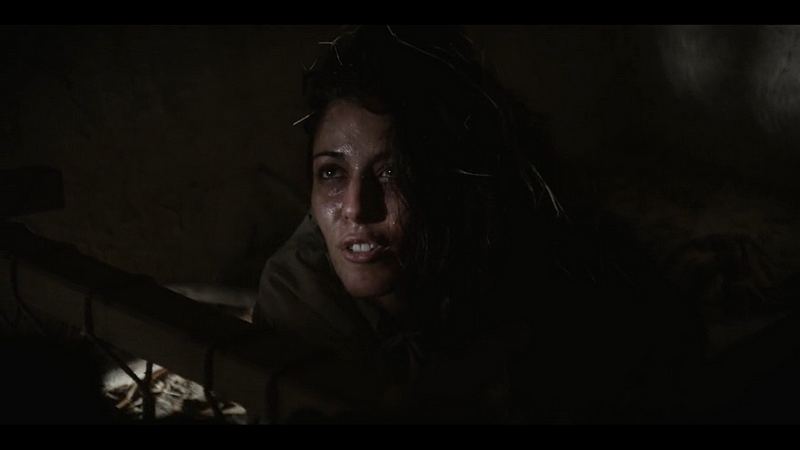
Simon goes home, where his wife Eden teases him for fighting with her brothers:
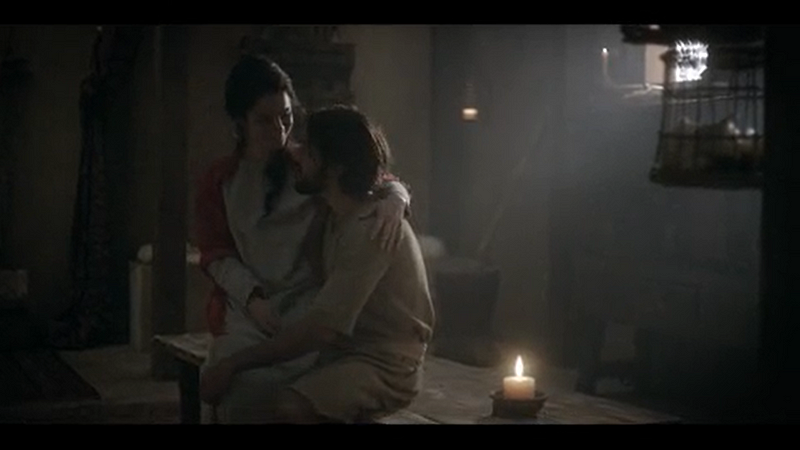
When Eden asks about his fishing, Simon lies about making a good catch.
Next we see Lillith trying to clean herself up:

She has a flashback of herself as a little girl, listening to her father cough and then seeing him lying on his deathbed as someone covers his still face with a blanket.
Lillith finds a piece of paper inside her doll. On it is written the words of Isaiah that her father quoted to her when she was little. She starts reading aloud, then stops to sob as she has flashbacks of a Roman soldier forcing himself on her.
Lillith rips the paper to shreds and makes her way to a tavern:

There, she chats with the proprietor, who is surprised to see her alive. He has heard of her recent troubles. He hugs her and gives her wine.
In return, Lillith gives him her doll and tells him to give it to his nephew.

“You’re beginning to scare me,” the man says as he accepts the gift with concern.
“You and everyone else,” Lillith says. She thanks him and adds, “there’s something I need to do.”
The tavern keeper tells her to keep drinking and stay until she feels better or until hell comes. “And if it does, we face it together.”
He is distracted by another customer. Lillith drinks her wine and leaves.
At home, Nicodemus is upset that he was unable to help the poor demon-possessed woman.
His wife tells him that they have a dinner engagement to go to.
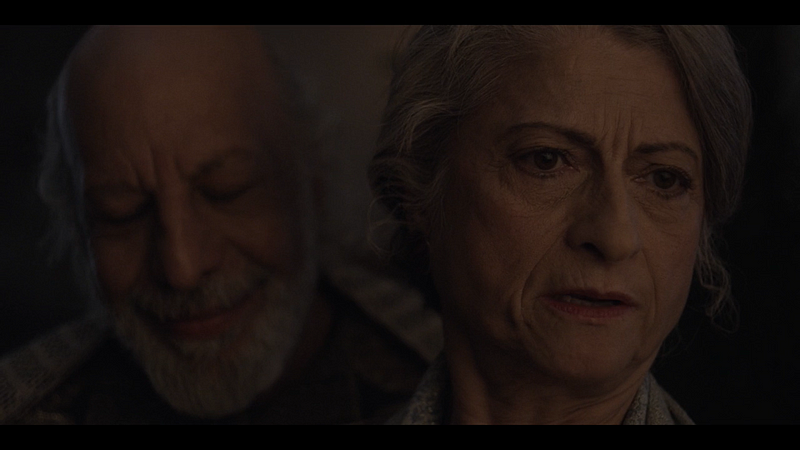
Nicodemus wonders aloud if what he knows of God is as blurry as the cheap mirror he and his wife look into. His wife sharply reminds him to keep his questions to himself. The others expect him to be knowledgeable and sure.
Nicodemus says to himself that only God Himself can help someone like Lillith.
Lillith makes her way to a cliff and throws her ripped-up paper with the words from Isaiah into the sea.
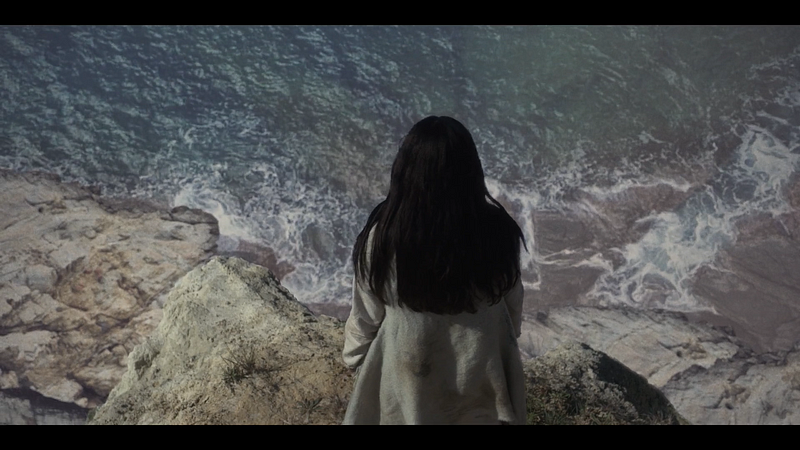
Just as she is about to throw herself after the paper shreds, Lillith spots a dove flying overhead. As if in a trance, she follows the bird away from the edge of the cliff.
Andrew and Simon go to Matthew’s booth to pay their taxes. But they find that they do not have enough to pay off even the interest on what they owe:
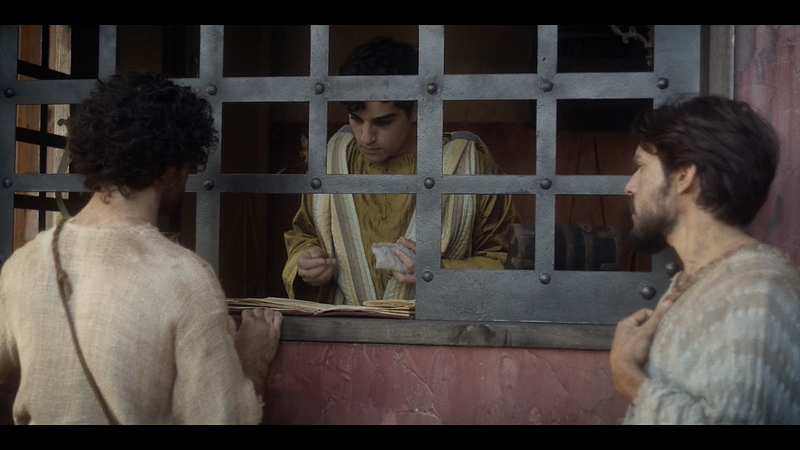
When a shocked Andrew says “we are ruined!” Simon pushes Andrew aside and says that he made an “arrangement with Quintus,” and therefore both of their debts have been covered for a year.
Suspicious, Matthew states that he will check their story with Quintus, directly.
Later, Simon tells Andrew that he discovered a Jewish merchant fleet poaching all the fish in the Sea of Galilee on the Sabbath, and offered to turn them over to Quintus. (Because Jews don’t normally fish on the Sabbath, anything they catch on the Sabbath isn’t taxed).
Andrew is less than pleased at the prospect of tattling on their fellow Jews, but Simon argues that he’s trying to make a way “for the little guy.”
There is a quick shot of Matthew and Gaius in line to see Quintus, and then the camera takes us to Lillith as she follows the dove back to the city and returns to the tavern.
A local man tries to harass her, but the tavern owner chases him off:

Lillith asks for more wine. The tavern owner protests that it won’t help her, but when Lillith says please, he acquiesces.

But when Lillith reaches for the wine, a Stranger’s hand covers hers. Lillith looks up and sees his face:

Lillith immediately has a headache, and rushes out of the tavern, wine cup in hand, but The Stranger follows. “Leave me alone!” she says. But he calls her name:
“Mary!…Mary of Magdala.”
Lillith/Mary drops the cup she had in her hand and it shatters on the ground.
“Who are you? How do you know my name?”
The Stranger answers with the words of Isaiah:
“Thus says the Lord who created you
And He who formed you
Fear not, for I have redeemed you
I have called you by name
…You are mine.”
Then Jesus (because of course that’s who The Stranger is), puts his hands on Mary’s temples, and she bursts into tears. He gently pulls her to him and lets her cry into his chest:
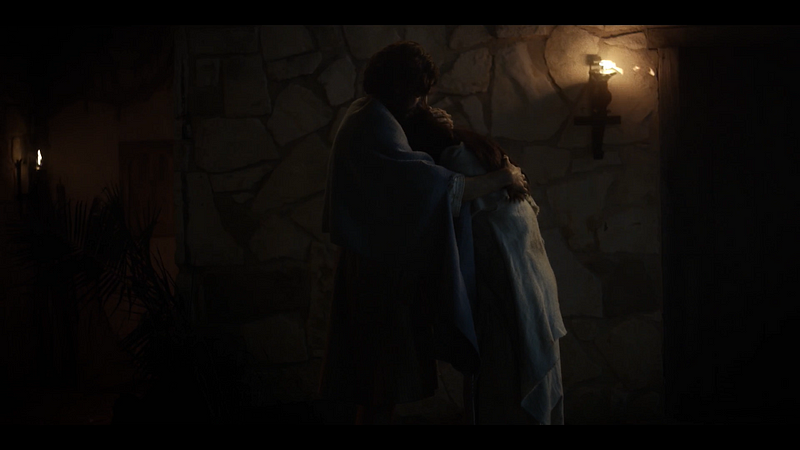
Background
Aside from the words of Isaiah, almost nothing in this first episode comes directly from the Bible. But it’s all necessary to set up the rest of the story.
In this first episode, we meet Mary Magdalene (who spends most of the show under the alias “Lillith”), a traumatized, alcoholic, demon-possessed woman at her wits’ end.
We also see fiery Simon and his longsuffering brother Andrew, poor fishermen who are in danger of losing their house and livelihood to Rome’s heavy taxes.
Then there’s Matthew, the tax collector, hated by all. And Nicodemus, the great teacher (rabbi) and Pharisee who chafes under the control of the Romans and wonders if there’s more to this “God thing” than he knows.
All of these people are in the actual gospels, but the show fleshes out their backstory and personality far more than the Bible text reveals.
So far, the show writers have done their best to stick either to the original Bible stories, or to what could be plausible, based on what we know from the Bible and other historical sources.
Obviously, in order to produce a multi-episode, multi-season show, we’ll need a lot more background material than the Bible mentions, and so far the show has done a really intriguing job filling in unknowns and even linking different characters’ stories together:
- Matthew is not just some random tax collector, he is Simon and Andrew’s tax collector. (Which will make their chemistry as future teammates a lot more interesting :D)
- The Bible mentions that Jesus drove seven demons from Mary Magdalene, and that’s all it says about that. In this show, however, the writers have Nicodemus try (in vain) to help her first. He fails, but then Jesus finds Mary in a tavern and heals her.
- The Bible never says how or why Mary became possessed, but the show gives a plausible backstory: the early loss of her beloved father, then rape by a Roman soldier contributed to Mary’s descent into alcoholism and demon possession.
Throughout the show, there are a lot of references to biblical and historical people, places, and concepts— easter eggs for those who are familiar with the original text.
But in case anyone is reading this who would like to have some more context, here are a few notes:
Capernaum near the Sea of Galilee
The name Capernaum means “Nahum’s village,” and it was a small fishing village located on the North side of the Sea of Galilee. It’s also the site of many of Jesus’ miracles, the center of his activities while he was among the Jews.
Pharisees, Essenes, Sadducees, Zealots, Random Preachers in the Wilderness
When Quintus and Nicodemus meet, Quintus mentions multiple Jewish groups who all claim to follow the same One God. Here are the ones he spoke of:
- The Pharisees were a Jewish group that believed in resurrection and in following Jewish rules and traditions of the fathers. They were known as legal experts, and were respected and powerful in their communities. Nicodemus is a Pharisee.
- The Saduccees, unlike the Pharisees, were a Jewish sect that didn’t believe in the supernatural: resurrection, spirits, or angels. They also didn’t care for the oral traditions, only the written law. They were the party of the wealthier people in society.
- The Essenes are most notable for withdrawing from society and public life. They believed most of what the Pharisees believed, but did so in their own mystic, monastic way.
- The Zealots were a group that believed in overthrowing their Roman oppressors by any means necessary, including violence. They were aggressive in their opposition to Roman paganism/polytheism, and were considered by some to be terrorists.
- Random preachers in the wilderness: This could be a nod to John the Baptist, perhaps, but at this time in history, Jesus was not the only one who claimed to be the Messiah. There were plenty of itinerant, charismatic men who used the suffering Jewish people’s desire for a Messiah to gather followers and set themselves up as leaders. Of course, all of them were eventually cut down, most likely killed by the Romans. But Quintus could’ve been talking about any one of these people.
The Jews and the Romans
As you probably already know, Rome conquered most of Western Europe before the empire collapsed.
Every time the Romans conquered a new place, they worked hard to assimilate the locals to the “Roman way.”
But the Jews were a stubborn folk and insisted on holding on to their beliefs and religious practices.
In other words: The Jews hated Rome for their paganism and violent subjugation. The Romans hated Jews for their obstinacy and “backwards” ways.
Translation: It was not a fun time to be living in Israel.
Rabbi
“Rabbi” is a title given to Jewish religious teachers and leaders. Nicodemus and his fellow Pharisees would be considered “rabbis” to the rest of the “ordinary people.”
“Your bug-eating friend”
When Andrew protests at the idea of Simon fishing on the Sabbath, Simon asks if he’s going to tattle to his “bug-eating friend.”
He’s referring, of course, to John the Baptist, Jesus’ cousin, who spent much of his time in the desert, baptizing people in the Jordan River after telling them to repent of their sins.
In the Bible, John the Baptist was recorded to have worn clothes made of camel hair and eaten locusts and honey.
John’s clothes were made of camel’s hair, and he had a leather belt around his waist. His food was locusts and wild honey. People went out to him from Jerusalem and all Judea and the whole region of the Jordan. Confessing their sins, they were baptized by him in the Jordan River.
— Matthew 3:4–6
And Andrew was one of John’s followers before Andrew graduated to following Jesus:
The next day John was there again with two of his disciples. When he saw Jesus passing by, he said, “Look, the Lamb of God!”
When the two disciples heard him say this, they followed Jesus…Andrew, Simon Peter’s brother, was one of the two who heard what John had said and who had followed Jesus.
— John 1:35–40
Hence, Simon’s reference to Andrew’s “bug-eating friend” 🙂
Lillith
The Bible never mentions Mary Magdalene being an alcoholic or using “Lillith” as an alias. Just that Jesus “cast seven demons from her.” No other details given. However, the fact that the show chooses to depict her in this way is at least possible.
The name Lillith comes from Judeo-Christian mythology. She is sometimes said to be a demon, sometimes “Adam’s first wife,” before Eve. This latter idea is not in the Bible, it’s attributed to Kabbalistic beliefs.
So “Lillith” is a fitting name for Mary’s pre-deliverance alias. A woman, possessed by demons, taking on the name of a demon.
Shabbat
“Shabbat” is the Hebrew word for “Sabbath,” aka Saturday, the weekly day of rest on which no observant Jew does any work. Sabbath/Shabbat starts from Friday sundown and ends on Saturday sundown.
During this time, religious Jews gather with family and friends for Shabbat dinner, for services at their local synagogue, and for worshipping and reflecting on God.
Sabbath observance is required in the Ten Commandments, in Exodus 20 and Deuteronomy 5. That’s why Nicodemus preached against working on the Sabbath, and why Andrew was upset that Simon was fishing on the Sabbath — working on Shabbat is not allowed.
Tax collectors
In the time when Romans controlled Judea, the place where the Jews lived (Israel), they collected taxes from the general public using tax collectors — local Jews who volunteered to extract money from their fellow citizens to pay the Roman government.
These tax collectors were doubly hated:
First, because they willingly collaborated with the brutal Jewish oppressors, the Romans. Second, because tax collectors almost always cheated their fellow Jews, asking for more money than was required in order to line their own pockets.
Anyone who became a tax collector was ostracized and rejected from “good society.” They were counted as dirty (or dirtier) than prostitutes and lepers, and loathed.
That’s why in the show you see (and will continue to see) Matthew insulted, ignored, looked down on, and attacked by locals.
Graffiti: “Messiah will destroy the Romans”
Before Jesus revealed himself, the Jewish conception of the Messiah was that he would be a warrior who would free them from Roman occupation. This was what all the disciples thought, as well, which made Jesus’ actions all the more inscrutable to them.
Which is why, when Nicodemus goes to see Lillith/Mary for the first time, viewers see graffiti on the wall, translated as “Messiah will destroy the Romans.”
To this day, non-Messianic Jews continue to watch out for their Messiah, although they no longer see him as a Rome-defeating warrior.
Okay, that’s about all for now. Moving on to thoughts on the storytelling itself:
Thoughts on Storytelling, Writing, & Craft
To be honest, I didn’t watch The Chosen from Episode One. I actually jumped in the middle, and then went back to the first episode.
And at first, I admit I was a bit bored by the slow pacing. But there were a few jewels that kept me watching, aside from the motivation of curiosity at seeing a new adaptation of the familiar old stories.
(And as I continued watching, the series just kept getting better and better. So if you’re like me, give the show a chance by watching at least a few episodes before passing judgment!)
For one, there’s the opening credits:
In a crowd of blase gray fish, 13 fish turn blue, one by one, and start swimming against the crowd. They represent, of course, Jesus and his 12 disciples.
But they also symbolize Christians from all places, of all times. As John writes in his gospel:
If you belonged to the world, it would love you as its own. As it is, you do not belong to the world, but I have chosen you out of the world. That is why the world hates you.
— John 15:19
Those who follow Jesus will always be “swimming against the current,” so to speak. So it’s very fitting, that image of the handful of blue fish swimming against the pattern established by the majority gray fish.
Not to mention the “nontraditional” music for the opening credits also signals that the show creators are trying to follow Isaiah 43:19 and “do something new.”
Intriguing Characterization
Then, I was immediately intrigued by the show’s portrayal of Matthew the tax collector.
From the first few seconds of watching the actor’s portrayal of Matthew, I knew the show writers had decided to depict him as having autism. Which I found really unique and intriguing. Although I never visualized the real Matthew as being on the autism spectrum, it works, for this show.
Considering that Matthew was a tax collector, hated by all, it’s not out of the realm of possibility that the whole “nobody likes me” thing may have started from before he went into Roman employ.
It makes sense that someone who already finds it difficult to socialize with others would think it a good idea to take on a job that would make him a permanent outcast.
After all, he’s already semi-rejected by society because his brain works differently, so a little more rejection can’t hurt much, right?
It’s fun to see how the show creators fill in the blanks based on the established Bible narrative. Given Matthew’s job, plus the way he wrote his gospel (methodical, starts with a genealogy), the idea that he may have been autistic is certainly plausible. And it adds depth and complexity to his character.
Show, Don’t Tell
The show writers use a lot of “show, don’t tell,” to give you need-to-know information. For example:
Matthew’s status is brilliantly illustrated by his conversation with the cart driver, who is upset at seeing him waste a pair of shoes, calls him “the biggest pile of dung in Capernaum,” and dumps him outside the market gates because he doesn’t want to be seen with an “evil” tax collector.
And Simon’s impetuous personality and growing desperation is shown by his fighting, gambling, and impulsive decision to make a bargain with the Roman Quintus to turn in his fellow Jews.
Of course, there are places where the show cuts out or combines details, or overdoes the background-information a tad, but it’s not overly distracting.
Circular Storytelling & Symbolism
Finally, I love the use of circular storytelling and symbolism:
We start with little Mary sitting on her father’s lap as he comforts her with the words of Isaiah, even as it’s obvious that his health is declining. The verse he chooses ends with the words, “you are mine.”
In that context, “you are mine” could be said to refer to Mary’s close relationship to a kindly father.
Later, we know that Mary loses her father, takes on the alias Lillith, and gets abused by a Roman soldier. It’s implied that many others also hurt her (Rivka talks about how Lillith/Mary only “hurts those who hurt her first. Mostly”).
When we see Mary, she is at the end of her rope, ready to jump off the cliff and end her misery.
But something makes her stop and go back to town, where she meets Jesus who speaks to her the same words her father gave her when she was a child:
“You are mine.”
Mary lost her human father many years ago, but with Jesus’ appearance on the scene, she is reconciled to her Heavenly Father, to whom she belongs even more so than to the loving father of her childhood who taught her the words of the prophet Isaiah.
Areas of Improvement?
If I were to critique this episode, I would just have a few light areas of improvement:
First, the pacing is a little slow, although I can understand why — this first episode functions as a setup for a lot more interesting things coming down the pike.
(Ex: There are a couple scenes of Nicodemus preaching against fishing on the Sabbath, which makes sense for what’s going to happen in coming episodes, but I admit I kind of fast forwarded mentally through those parts, heheh ;D)
Second, I’m not sure about the demon-possession portrayals. I think mostly they did a good job. I appreciate that there weren’t extreme dramatic CGI effects taking away from the storyline. And likely in real life, demon possession is really more low-key than Hollywood likes to portray it.
I just felt that someone who is possessed by seven demons might be a bit more messed-up-looking than Mary appears to be — she’s mostly disheveled and weepy and depressed, with a little bit of off-screen screaming and blood. But then again, do I really want to see her scratching someone bloody in a demonic frenzy? Nah. Would probably hurt the PG ratings too. So on second thought, this part is fine.
And finally: When you’re writing stories, you want to connect as many dots as you can, generally speaking, but sometimes you have to be careful not to overdo it…like the fact that Simon was fighting with his brothers-in-law, when it could have been everyone, but it’s useful for him to fight with Jehoshaphat and Abraham because then the show can introduce those characters AND show off Simon’s personality at the same time.
Same with Eden fake-scolding Simon for fighting with her brothers. Their conversation was a useful vehicle for fleshing out these characters’ personalities and relationship, but it felt a little bit contrived.
These are little nitpicky things, however. Overall, it’s been a solid start to a promising series on Jesus and his disciples!
More to come…
Reminder
Watch The Chosen for free on their website, or download the app at: https://watch.angelstudios.com/thechosen
Ready to be a Brilliant Writer?
I’ve created The Brilliant Writer Checklist to help you clarify your message, reach more readers, and change the world with your words.

I loved your in-depth review of “The Chosen”! It’s my favorite show, and I love the way they have fleshed out the Biblical story. With the disclaimer Dallas Jenkins himself used, saying it was NOT the Bible, and was heavily fictionalized (with the conditions that any added backstories should be plausible, as you mentioned), it does a great job of digging into the Bible’s terse wording and giving fun but believable reasons for the disciples behaving as they did.
I have to call to attention two tiny things, though…Nicodemus’s “carriage” was not horse-drawn, as the photo you posted shows (note the four white-clad guys. The carriage was “man-powered.” 🙂 ). And “Chavarim Maqqaba does not mean “Peace, Friends.” (Chavarim Shalom means peace, friends, or friends of peace.) Chavarim Maqqaba means “Friends of the Hammer” (the Hammer was the name of the bar Mary/Lilith went to. It was also the nicknames of the father/sons team a couple hundred years earlier who had chased the Greek invaders out of Israel and founded the Hasmonean dynasty).
I agree that episode one is slow-moving, but at the same time it’s so loaded with atmosphere and characterization that in the end there’s not much to complain about. And since they’re taking seven years (the planned length of the series) to depict events that took only three or four “real-life” years, it has to move a little slowly. Better for us to get totally sucked into the time, place, and people. “The Chosen” does not, as some have said, “bring the Bible to life.” The Bible is already living (and powerful–so says the writers of Hebrews in chapter 4, verse 12). But it does provide a totally immersive context for the events, as opposed to most “life of Christ” movies and miniseries that, as you said, give Jesus a little too-holy demeanor, and a disjointed, out-of-sync-with-history background. And best of all, it shows Jesus as a Jew, followed by Jewish disciples, living Jewish lives–something your blond-haired blue-eyed Jesus movies *never* do. Thanks for your review, and I hope you write about “The Chosen” again!
Thank you Mel! Good point, and thanks for the corrections 🙂